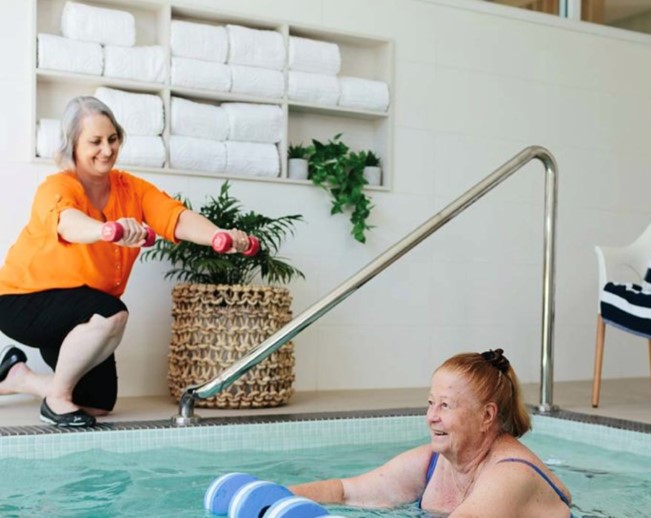NewDirection Care's MICRO TOWN® Model De-Institutionalises Aged Care

Many of the accepted approaches that have dominated over 50 years of aged care practice in Australia emanate from the attitudes of the 1970s and beyond, when institutionalised care was the norm. However, our world is now a place where individualism, choice and quality of life dominate our aspirations, and the same should be offered our ageing population.
The most recent review of aged care, the Royal Commission into Aged Care Quality and Safety, recommends providers move to smaller-scale housing models integrated within the local community in order to provide a home-like, rather than institutional or hospital-like, experience.
The first of its kind
New DirectionCare (NDC) established an inclusive village-like community known as a MICRO TOWN®—the first of its kind—where people live together with shared facilities allowing for mutual support, freedom of action and choice in a home-oriented atmosphere.
At Bellmere, residents live together in 17 domestic-style homes, each with seven residents forming a tight social unit. They receive all the care and services they need as well as the freedom to live the lives they choose.
Designed for the elderly and those living with younger onset dementia and complex care needs, the purpose-built MICRO TOWN® village also includes a shopping precinct, hairdresser, medical care and dental care.
The physical aspect of the village was thoughtfully considered, with trip hazards minimised and dementia-friendly principles incorporated. For example, both the interior and exterior designs incorporate colour contrast to support depth perception. Striking art was selected to act as way-finding points of reference for residents, along with the design and prominence of street signs and services.
Resident-centred and de-institutionalised
The resident-centred, de-institutionalised model and non-tasked based approach means residents:
- Choose what, when and where they want to eat, with access to a fully functioning accessible kitchen 24/7.
- Decided when they go to bed, wake up, and if they want a visitor overnight.
- Choose when they want to shower, toilet, get changed, and have a say on who provides this care.
- Come and go from their own house to visit others and access on-site amenities and services.
- Have diverse personal engagement opportunities on an individual or group scale.
- Retain their independence by being enabled to cook, clean, do laundry and garden, with support from the on-site team.
Paving the way for others to follow
NDC measures success not by revenue and profitability, but by the impact on the lives of residents and their families: improving resident quality of life, increasing loved one participation and engagement with and in MICRO TOWN®, resident self-determination and positive ageing.
NDC is paving the way forward and part of much needed change within the age services industry, demonstrating what is possible, and sharing the tools for other providers that wish to adopt an NDC-like model—in order to meet the changing needs of people requiring aged care in the 21st century.
A winning initiative
NDC were recognised for their work in reimagining aged care through a resident-centred, de-institutionalised model, as the winner of the Enhancing Consumer Experience award in the 2021 innovAGEING National Awards.
